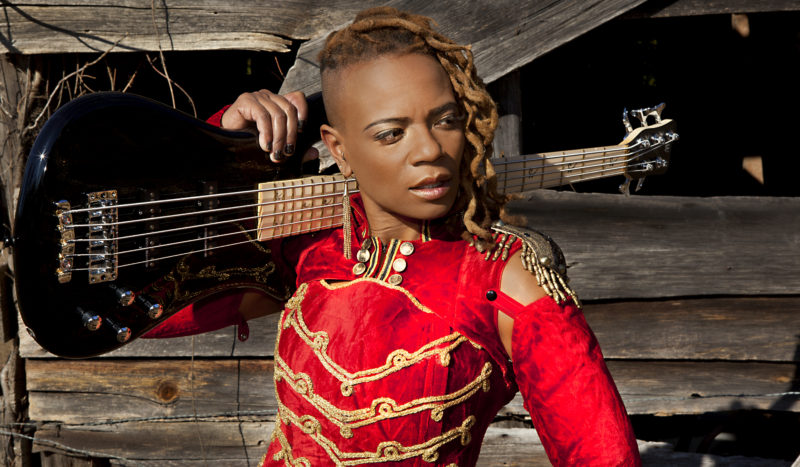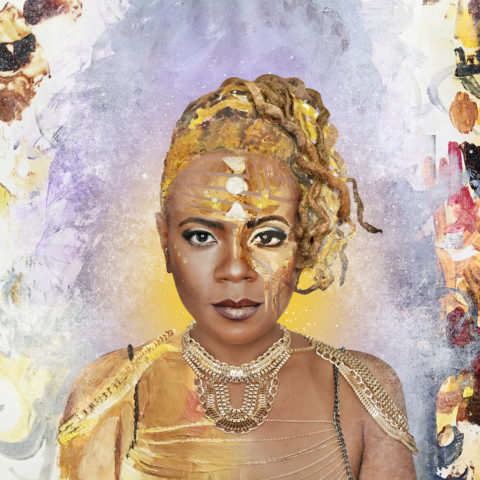Divinity walked into the restaurant at the Ace Hotel in NYC with the most inviting aura. When we got to chatting about her new record and how she started out rapping in elementary school, I felt like I was grabbing coffee with an old friend. Roxx invited GO readers into a little slice of her life with story after story. Covering everything from her favorite Beyoncé moment to her inspirational poetry professor June Jordan.
In her new album, ImPossible, you can feel her smooth beats moving through your soul. Divinity has a way to empower and inspire people through her music. When you get a chance to see her performing live, she invites you in to experience what she feels when creating her record.

GO Magazine: What is your love story with falling in love with music and the bass?
Divinity Roxx: I fell in love with music as a little kid because my mom was always playing different kinds of music. I remember riding in the back of her 1971 lime green Malibu, listening to all this music and feeling emotions I had never felt before. I had no choice but the fall in love with music. So, when they came around to our fourth-grade class asking who wanted to be in the band, my hand shot up. I wanted to play the saxophone at first, but my teacher made me play the clarinet which I thought was so lame. The chorus teacher came by and again, my hand shot up.
Around middle school, I stopped singing and playing the clarinet to start writing raps. I decided ‘I’m a rapper now.’ I remember recording all the rap shows that came down late at night in elementary school and I’d write down all the lyrics. I loved the idea of rhyming. I’d go to school and at the lunch table I’d spit all the hits off the radio.
I didn’t start playing the bass until my second year in college, I went to UC Berkley for journalism and I was emceeing on the side. One summer I went home and got a bass, I fell in love. I remember going back to my apartment every day after class and I’d just take off all my clothes and play the bass.
GM: You’ve played huge stadiums with Beyoncé to more intimate settings. What are your favorite crowds to play for?
DR: An attentive crowd. But also, I like the club crowd. 2,000 and under and you can really feel their vibe. Everyone is on the same ride and immersed in the moment, you can feel the magic. In the stadiums, it feels like you can never capture their energy. The room is just a little big to feel like you’re completely connected to the audience. You know, everyone wants the artist to look at them, to have one moment where they can connect. I like spaces where that intimacy between artist and audience can happen.
GM: What has your experience been on the “ImPossible” tour?
DR: This tour is never going to end; we are going to tour this record forever. We’ve already taken it all over the world – we did a tour before the album even came. It’s been a whirlwind really; I can’t remember all the places we’ve played.
GM: You’ve played everything from K-Pop to R&B to Jazz. What was your favorite genre growing up?
DR: I mean, I just fell in love with hip hop. That was my number one genre. I got into rock and jazz more once I started playing the bass.
GM: What was your favorite moment of touring with Beyoncé that really stood out?
DR: It was definitely the South American tour in 2010, around the time of my birthday. We were tired, we had been going on this tour for a long time. The Brazilians had been tweeted for over a year asking Bey to come, and I was one of the only band members with a twitter account so they were bombarding my Twitter. It got to the point that one day I tweeted when we were in rehearsal and they went in because they knew I was with Bey. I just finally asked her, “I know this might be inappropriate, but my Twitter page is blowing up and they are begging me to ask you to go to Brazil, so at least I can say I did it, I asked and it can be off my conscious.” She was like “Oh, okay, I’ve never done anything down there.”
Those fans are so crazy and they made that whole tour happen. When we got on the stage and I start playing that intro to Crazy in Love, we were all in a trance. But when you look out into the audience and you see 50 million Brazilians screaming their brains out I was like oh shit, this is great. We all felt the energy, even Bey started stepping a little bit higher. That was one of my fondest memories.
GM: This new album is very raw and personal. Does music have a personal release for you?
DR: Yeah, I think as an artist, writer, and creator everything I do has some sort of personal release for me. This album in particular, it’s a culmination of a lot of old songs and artistic ideas I never thought I’d share with anybody. These were my personal moments that I’d have late at night in my home studio just playing and recording. I never actually intended for them to be on an album. I pulled out an old hard drive and as I was listening I got caught up in the moment of creating it all over it again.
So yeah, I’m singing more on this album. It’s the first time on an album I address my sexuality which is something I’ve never talked about before. And you know, I’m in love so that played a huge part in it. I couldn’t pretend I was writing these songs for somebody else when they were clearly for her. When I approached this record, I did so like it was my last record. It’s tough being an independent artist. So I really gave this one my all.
GM: Do you think it will be your last?
DR: You know, I don’t know. I’ve been thinking about making some new stuff. I’ve been putting ideas down on my notes and all. You never know.
GM: Can you speak to your experience of working in the music industry as a queer woman?
DR: It’s funny because I remember being in high school and knowing that I was gay. And now it doesn’t feel like a big deal anymore. There have been a number of artists who have come out on record, breaking down barriers, and really making it okay.
I think that some of the older queer women still feel like they have to hide it. I want to be open about it, but there’s definitely a stigma still there for some women. It’s kind of like race, you know, as generations continue, you kind of hope to phase out racism. I used to write all those types of lyrics when I was younger but I would never perform them because I just never knew how people would take it. And sometimes, I still feel a little nervous about that. Especially when I was in Suriname, but I just put it out there and nobody said anything to me.
GM: Your single “We Are” has such an inspiring and positive message despite the heavy world we live in today, especially with the election. How do you keep such positive energy in your creative process?
DR: That song was really special for a number of reasons. Sometimes music speaks to you and tells you what it needs you to do and you have no control over it at all. When we came up with that chord progression in the studio, I just couldn’t stop singing we are, we are, we are. Then the next lyrics just came out naturally: the one’s we’ve been waiting for. It was so perfect because every day we wake up and there is war, there are kids dying from drones, and just awful things. I feel like there’s an energy and there are people out there who won’t accept that as the norm. I really feel like we are the ones we are waiting for. We have a responsibility as human beings to make the world a better place, I’m not sure if it’s because I’m idealistic and an Aquarius, but I felt it come through in this song.
Later on, I Googled the phrase we are the ones we’ve been waiting for, because I wanted to know who originally said it. I found out it was June Jordan at the UN as she was reading a poem about Apartheid. And you know, it comes full circle because I studied in June’s poetry class at UC Berkley. The song became even more special to me then because June passed away in 2007 before I got to see her again. The last time I saw her I was telling her I was going to move to Atlanta to become a rapper. It was sad because I had a really close relationship with her, she acted like my surrogate mom when I was so far away from home. She used to ask us “if you have two minutes to say something to the world, what would it be?” And I think I still write like that.
GM: What can we look from you for the future?
DR: We are really trying to get this record out there. It’s so honest and so raw, so I want to perform more. I’ve been doing a lot of teaching bass and I want to film some music videos for the record. I have a bunch of different projects, so it’ll be a surprise!
Check out Divinity Roxx on tour now. Her next show will be on Wednesday, November 20 in NYC at the Iridium at 8:30pm, tickets here.



What Do You Think?